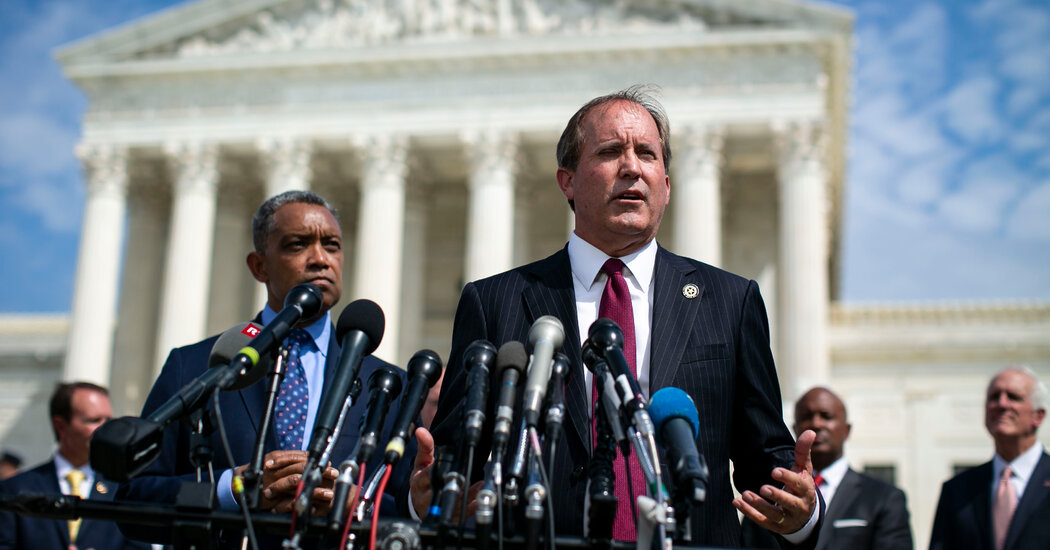A Texas law banning major social media companies from removing political posts became the first of its kind to go into effect Wednesday, posing complicated questions for major web platforms about how to comply.
The law, which applies to social media platforms in the United States with 50 million or more monthly active users, was passed last year by lawmakers who disagree with sites like Facebook and Twitter over removing posts from conservative publishers and personalities. . The law allows users or the state attorney general to sue online platforms that remove posts for expressing a particular point of view.
In a brief injunction on Wednesday, the United States Court of Appeals for the Fifth Circuit, based in New Orleans, overturned an earlier ruling that barred the state from enforcing the law. While tech industry groups challenging the law are expected to appeal the ruling, it creates uncertainty for major web platforms that can now face lawsuits if they decide to remove content for violating their rules.
The surprising ruling comes amid wider debate in Washington, state houses and foreign capitals about how to balance free speech with security online. Some members of Congress have proposed holding online platforms accountable for promoting discriminatory advertisements or misinformation about public health. The European Union agreed last month on rules designed to fight disinformation and increase transparency about how social media companies operate.
But conservatives have said the platforms are removing too much – rather than too little – content. Many of them applauded Elon Musk’s recent purchase of Twitter for promising lighter restrictions on speech. When the site banned President Donald J. Trump after the January 6, 2021 Capitol attack, Republicans in state houses proposed legislation to regulate how the companies enforce their policies.
“My office just got another BIG WIN against BIG TECH,” Texas Attorney General Ken Paxton said in a tweet after the law was reinstated. A spokesman for Mr Paxton did not provide details on how the Attorney General intended to enforce the law.
Florida passed a bill last year that fines companies for deleting the bills of some political candidates, but a federal judge has blocked it from taking effect after tech industry groups filed charges. The Texas bill takes a slightly different approach, saying that a platform cannot “censor a user, a user’s expression, or a user’s ability to receive another person’s expression” based on the “position of the user or any other person”.
The law doesn’t stop platforms from removing content when they are notified by organizations that track online child sexual exploitation, or when it “consists of specific threats of violence” against someone based on race or other protected characteristics of the person. The law also contains provisions that require online platforms to be transparent about their moderation policies.
When the Texas governor signed the state law in September, the tech industry filed a lawsuit to block it. It argued that the ban on platforms violated their own freedom of expression to remove anything they deem objectionable.
The US District Court for the Western District of Texas overturned the bill in December for violating the Constitution. When the appeals court quashed the court’s decision on Wednesday, it did not address the merits of the law.
Carl Szabo, the vice president of NetChoice, a group funded by companies such as Google, Meta and Twitter that filed a lawsuit to block the law, said: “We are weighing our options and plan to immediately appeal against the law. the order.”
Spokespersons for Facebook and Twitter declined to comment on their plans.
Jameel Jaffer, the executive director of the Knight First Amendment Institute at Columbia University, which has objected to the laws in Texas and Florida, said it was “really disturbing” that the appeals court rejected Texas’ argument that the law is legally admissible. was apparently had taken over.
“If you accept that theory, you give the government a far-reaching power to distort or manipulate discourse online,” he said.
Critics of the law say they believe platforms will get in trouble because of this: Leave disinformation and racist content or await lawsuits across Texas. Daphne Keller, a former attorney at Google who is now director of the platform regulation program at Stanford University’s Cyber Policy Center, said a company’s compliance with the law would “dramatically change the service they offer.”
Ms. Keller said companies might consider restricting access to their websites in Texas. But it’s unclear whether that move itself would violate the law.
“If you’re the companies, I’m sure you’re thinking, ‘Can we do that?'” she said. “Then there is the question of how that would play out in the public eye.”

